Titan, Prometheus, The Eternal Firebearer
“Discover the shocking truth behind Prometheus, the Titan who defied the gods and sparked humanity’s rise with stolen fire!”
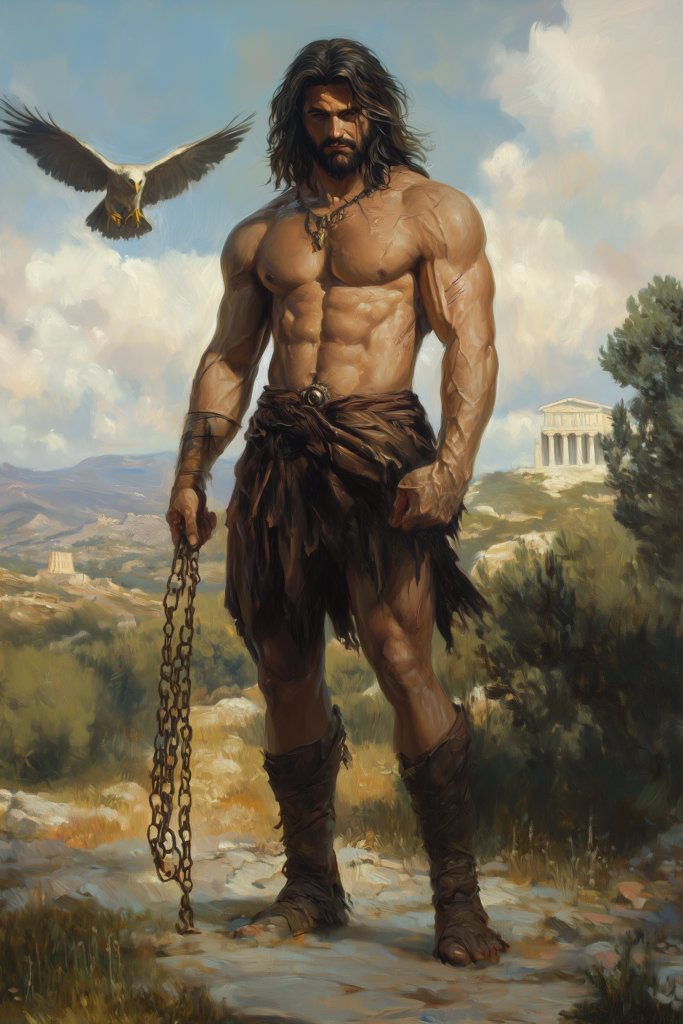
- Pantheon: Greek (Titanic)
- Deity Title: The Firebringer, The Liberator, The Foresighted One
- Deity Symbol: A burning torch, an open flame, or a broken chain
- Home Plane: Mount Olympus (formerly), later wanders the Mortal Realm
- Deity Level: Lesser God (Former Titan)
- Alignment: Chaotic Good
- Aliases: The Bound One, The Lightbringer, He Who Defied Zeus
- Superior: None (formerly under Zeus, now independent)
- Traditional Allies: Hercules, Athena (goddess of wisdom), Hephaestus (god of craft), Humanity itself
- Traditional Foes: Zeus (formerly), other gods who seek to suppress knowledge and free will
- Divine Artifact: The Ever-Burning Flame (a torch that never extinguishes, representing eternal knowledge)
- Servants: Human philosophers, inventors, rebels, and revolutionaries
- Servitor Creatures: Ravens (symbols of foresight), Fire Elementals, Phoenixes (symbols of rebirth and learning)
- Sacred Animal: Eagle (once a tormentor, now a symbol of defiance and triumph)
- Manifestations: A guiding light in darkness, a whisper of knowledge in moments of doubt, a sudden burst of inspiration in the minds of the worthy
- Signs of Favor: Unexplained flames flickering in dark places, dreams of soaring eagles, sudden bursts of insight or invention, warm wind on a cold night
- Worshipers: The Carbonari, “The Emberbound Brotherhood” – Philosophers, scholars, scientists, blacksmiths, revolutionaries, explorers, inventors, teachers
- Cleric Alignments: Chaotic Good, Neutral Good, Chaotic Neutral
- Specialty Priests: Torchbearers (priests who spread knowledge), Firekeepers (those who guard sacred flames), Liberators (those who defy oppression)
- Holy Days:
- Day of the First Flame (celebrating the moment fire was gifted to humanity)
- Festival of Defiance (commemorating his freedom from Zeus)
- Day of Discovery (honoring new inventions and breakthroughs)
- Portfolio: Fire, Knowledge, Innovation, Rebellion, Freedom, Civilization, Sacrifice, Foresight
- Domains: Knowledge, Fire, Liberation, Trickery, Forge
- Favored Weapon: Longsword (a symbol of strength, defiance, and the fight for knowledge and freedom), Hammer (symbolizing invention)
- Favored Class: Wizard, Artificer, Bard, Cleric of Knowledge or Forge
- Favored Race: Humans (for their potential), but also welcomes any who seek enlightenment
- Duties of the Priesthood:
- Spread knowledge and fight ignorance
- Oppose tyranny and unjust rulers
- Preserve books, inventions, and wisdom
- Inspire creativity, discovery, and free thought
- Major Cult/Temple Sites:
- The Great Library of Alexandria (once his greatest shrine)
- Hidden sanctuaries in universities and smithies
- Secret places where knowledge is protected from destruction
- Benefits:
- Followers gain enhanced intelligence and insight
- Divine protection against censorship and oppression
- The ability to summon divine fire to guide and defend themselves
- Significant Others: No known romantic consort, but deeply connected to humanity as his chosen people
Prometheus is a Titan from Greek mythology, known as a symbol of rebellion, intellect, and self-sacrifice. As one of the primordial beings, he was born to the Titan Iapetus and the Oceanid Clymene. He is best known for his act of defying Zeus, the king of the Olympian gods, by stealing fire from Mount Olympus and giving it to humanity.
This gift of fire allowed humans to progress in civilization, advancing their ability to cook, create tools, and harness technology, thus setting the foundation for society as we know it. In response to his defiance, Zeus condemned Prometheus to an eternal punishment—being chained to a rock where an eagle would eat his liver every day, only for it to regenerate each night.
Prometheus’ Story:
Role: Titan Deity of Forethought, Protector of Humanity
Purpose: He acts as a protector and benefactor of humankind, granting them the power to evolve and thrive. His primary purpose is to elevate humanity from its primitive state and ensure its survival and development. He is a figure of foresight, embodying intelligence, creativity, and defiance against the oppressive rule of the gods.
Motivation: Motivated by compassion for humanity and a belief in their potential, Prometheus sought to empower them through the gift of fire, enabling them to reach their full potential. His actions were driven by a desire to break the tyranny of the Olympian gods, particularly Zeus, who sought to keep humanity in a state of ignorance and subjugation. He hoped that with fire, humanity would rise to greatness, able to thrive and become independent of the gods.
Goals: Through his defiant actions, Prometheus aims to prove that humans have the capacity for growth and self-sufficiency. He wishes to inspire innovation and progress, and ultimately, he seeks to create a world where humans no longer depend on the gods for survival and knowledge. His sacrifice embodies the cost of standing up for what one believes in, even in the face of immense suffering.
Prometheus’ legacy lives on as a symbol of enlightenment, defiance against unjust authority, and the transformative power of knowledge and sacrifice.
Prometheus 5e
Prometheus 3.5
Prometheus, The Firebringer
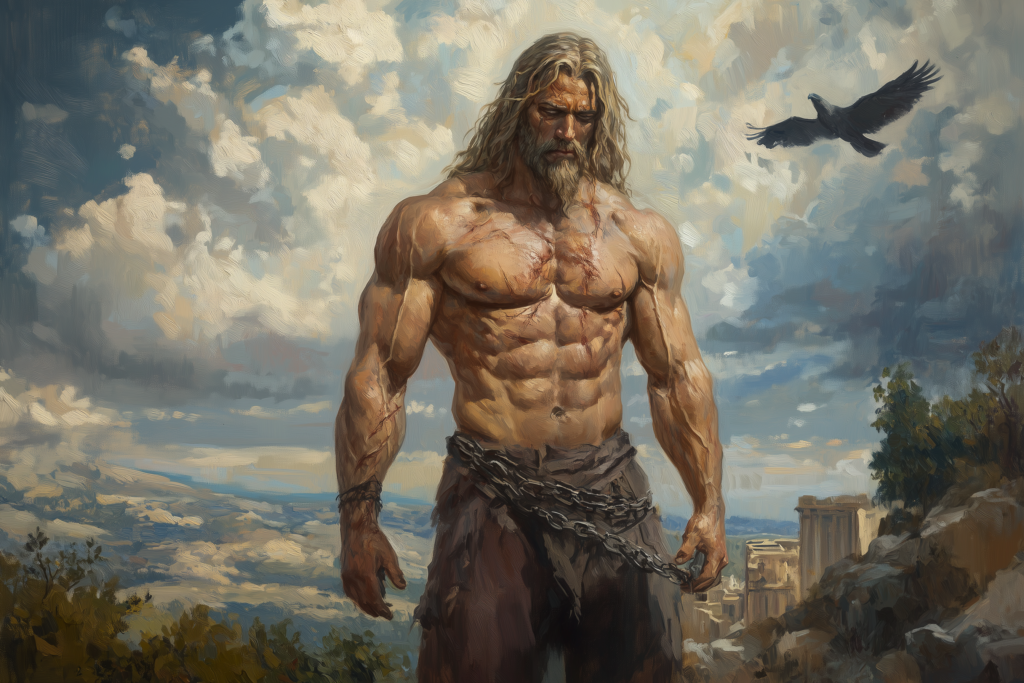
Lesser Deity (Titan), Chaotic Good, Huge,
Armor Class 26 (Divine Resilience)
Hit Points 1,040 (32d20 + 320)
Speed 60 ft., Fly 120 ft. (hover)
Abilities
| STR | DEX | CON | INT | WIS | CHA |
|---|---|---|---|---|---|
| 32 (+11) | 26 (+8) | 34 (+12) | 32 (+11) | 30 (+10) | 35 (+12) |
Saving Throws STR +20, DEX +17, CON +21, INT +20, WIS +19, CHA +21
Skills Arcana +20, History +20, Insight +19, Perception +19, Persuasion +21, Religion +20
Damage Resistances Radiant, Psychic, Thunder
Damage Immunities Fire, Lightning, Necrotic, Poison; Bludgeoning, Piercing, and Slashing from Nonmagical Attacks
Condition Immunities Charmed, Frightened, Paralyzed, Petrified, Poisoned, Stunned
Senses Truesight 120 ft., Passive Perception 29
Languages All, Telepathy 120 ft.
Divine Traits
Lesser Deity. Prometheus cannot be permanently killed unless a greater deity or cosmic force decrees it. If reduced to 0 HP, he reforms in 1d10 days.
Foresight of the Titan. Prometheus always acts first in combat. He cannot be surprised and automatically succeeds on Initiative rolls. He also has advantage on all saving throws.
Firebringer’s Blessing. All friendly creatures within 60 feet of Prometheus gain resistance to fire damage and advantage on Intelligence and Wisdom saving throws.
Legendary Actions (3/Turn)
Prometheus can take three legendary actions, choosing from the options below. He regains spent legendary actions at the start of his turn.
- Flame of Inspiration. One ally within 60 feet gains a free reaction and can immediately take an action or cast a spell.
- Ignite the Soul. A target within 30 feet takes 60 (10d10) fire damage and must make a DC 29 Wisdom saving throw or be charmed for 1 minute, believing Prometheus is a divine messenger of truth.
- Titanic Strike. Prometheus makes a Longsword attack.
Actions
Multiattack. Prometheus makes three Longsword attacks and one use of Firestorm or Divine Command.
Longsword. Melee Weapon Attack: +21 to hit, reach 10 ft., one target. Hit: 50 (6d10 + 11) slashing damage.
Firestorm (Recharge 5-6). Prometheus calls forth divine fire in a 60-foot radius. Creatures of his choice take 120 (20d10) fire damage, or half on a DC 29 Dexterity save. Objects in the area ignite.
Divine Command (Recharge 4-6). Prometheus forces up to 5 creatures within 120 feet to make a DC 29 Intelligence saving throw or be stunned until the end of their next turn. Creatures with Intelligence 10 or lower automatically fail.
Mythic Actions (Once Bloodied)
When reduced to half HP, Prometheus ascends to his true form, his presence radiating divine defiance and unbreakable will. His Firestorm ability is replaced with Storm of Defiance, and he gains the following actions:
Storm of Defiance (Recharge 5-6)
Prometheus unleashes a maelstrom of divine energy, disrupting his foes and empowering his allies.
- All enemies within 120 feet must make a DC 28 Constitution saving throw or take 100 radiant damage and be blinded for 1 minute (save ends at end of turn).
- All allies within range are cleansed of all debuffs and conditions (charmed, frightened, paralyzed, restrained, stunned) and gain advantage on attacks and saving throws for 1 minute.
Titanic Smite
Prometheus makes a Longsword attack, dealing an additional 100 radiant damage on hit. If the target is a deity, titan, or celestial being, they must make a DC 28 Strength saving throw or be knocked prone.
Break the Chains (1/Day)
Prometheus shatters the very concept of oppression, filling his allies with unwavering determination.
- All friendly creatures within 60 feet immediately break free of all charmed, frightened, grappled, paralyzed, or restrained conditions.
- They can immediately take an action, either making an attack, moving up to their speed, or casting a spell.
Lair Actions (In Sacred Sites)
When in a place of worship dedicated to knowledge, invention, or rebellion, Prometheus can take one of these lair actions at initiative 20:
- Sacred Knowledge. All allies gain advantage on saving throws and +5 to Intelligence and Wisdom rolls for 1 minute.
- Forgefire. Prometheus conjures divine flame, granting allies fire resistance and a +2 bonus to weapon attacks for 1 minute.
- Revelation. Prometheus speaks a cosmic truth. All enemies in the lair must make a DC 29 Wisdom saving throw or be blinded for 1 minute, overwhelmed by divine insight.
Divine Goals
- Spread knowledge and defy oppression.
- Ensure humanity never returns to ignorance.
- Guide revolutionaries, inventors, and seekers of truth.
- Oppose Zeus and other gods who suppress knowledge.
Final Notes
CR: 28
Challenge Type: Mythic Lesser Deity
Intended Encounter: World-shaking battle, divine conflict, or legendary test of mortals.
DM Tips for Using Prometheus
- He should be a mentor or mysterious figure rather than just an enemy.
- His battle should be epic, fire-filled, and full of strategic insight.
- If fought, let him teach the party something profound before his departure or defeat.
- He should be nearly unkillable, requiring divine intervention to remove permanently.
Prometheus
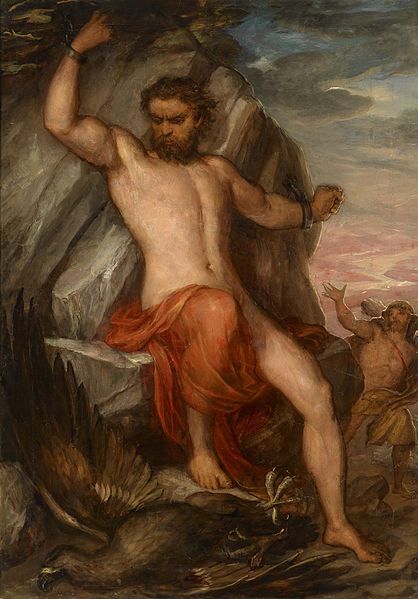
Prometheus “forethought” is a Titan known for his wily Intelligence, who stole fire from Zeus and gave it to mortals for their use. He was then punished for his crime by Zeus. Prometheus is credited with (or blamed for) playing a pivotal role in the early history of humankind.
Prometheus is a son of the Titan Iapetus by Themis, one of the Oceanids. As a son of Iapetus he was also a brother of Atlas, Menoetius and Epimetheus. Prometheus is a lowly challenger to Zeus‘ omniscience and omnipotence.
At Sicyon, a sacrificial meal marking the “settling of accounts” between mortals and immortals, Prometheus played a trick against Zeus. He placed two sacrificial offerings before the Olympian: a selection of bull meat hidden inside an ox’s stomach (nourishment hidden inside a displeasing exterior), and the bull’s bones wrapped completely in “glistening fat” (something inedible hidden inside a pleasing exterior).
Zeus chose the latter, setting a precedent for future sacrifices; henceforth, humans would keep the meat for themselves and burn the bones wrapped in fat as an offering to the gods. This angered Zeus, who hid fire from humans in retribution.
Prometheus at once went to Athena with a plea for admittance to Olympus, and this she granted. On his arrival, he lighted a torch at the fiery chariot of the Sun which presently broke from it a fragment of glowing charcoal, which he thrust into the pithy hollow of a giant fennel-stalk. Then, extinguishing his torch, he stole away, and gave fire to mankind.
This further enraged Zeus, who sent Epimetheus, brother of Prometheus, Pandora, the first woman, fashioned by Hephaestus out of clay and brought to life by the four winds, with all the goddesses of Olympus assembled to adorn her. “From her is the race of women and female kind,” Hesiod writes; “of her is the deadly race and tribe of women who live amongst mortal men to their great trouble, no helpmeets in hateful poverty, but only in wealth.”
Prometheus, in eternal punishment, is chained to a rock in the Caucasus, where his liver is eaten daily by an eagle or vulture, only to be regenerated, due to his immortality, by night . Years later the Greek hero Heracles would shoot the vulture and free Prometheus from his chains.
Here, the poet expands upon Zeus‘ reaction to the theft of fire. Not only does Zeus withhold fire from men, but “the means of life,” as well (42). Had Prometheus not provoked Zeus‘ wrath (44-47), “you would easily do work enough in a day to supply you for a full year even without working; soon would you put away your rudder over the smoke, and the fields worked by ox and sturdy mule would run to waste.”
Hesiod also expands upon the Theogony’s story of the first woman, now explicitly called Pandora. After Prometheus’ theft of fire, Zeus sent Pandora to Prometheus’ brother Epimetheus. Pandora carried a jar with her, from which she released (91-92) “evils, harsh pain and troublesome diseases which give men death.”
Aeschylus
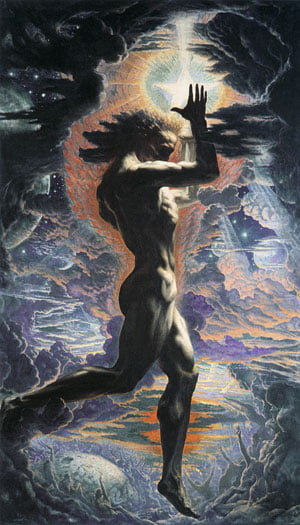
Perhaps the most famous treatment of the Prometheus myth can be found in the Greek tragedy Prometheus Bound — traditionally (but uncertainly) attributed to the 5th-century BC Greek tragedian Aeschylus. The drama is likely the first play of the otherwise non-extant Prometheia trilogy. At the center of the drama are Prometheus’ theft of fire and his subsequent punishment by Zeus; in this, Aeschylus’ dependence on the Hesiodic source material is clear.
The Prometheus Bound also includes, however, a number of changes to the received tradition. Some of these changes are rather minor. For instance, rather than being the son of Iapetus and Clymene — and hence, Zeus‘ cousin — Prometheus becomes the son of Gaea — and Zeus‘ uncle. Also, the chorus makes a passing reference to Prometheus’ wife Hesione.
Before his theft of fire, Prometheus played a decisive role in the Titanomachy, securing victory for Zeus and the other Olympians. Zeus‘s torture of Prometheus thus becomes a particularly harsh betrayal. The scope and character of Prometheus’ transgressions against Zeus are also widened. In addition to giving humankind fire,
Prometheus claims to have taught them the arts of civilization, such as writing, mathematics, agriculture, medicine, and science. The Titan’s greatest benefaction for humankind seems to have been saving them from complete destruction. In an apparent twist on the myth of the so-called Five Ages of Man found in Hesiod’s Works and Days (wherein Cronus and, later, Zeus created and destroyed five successive races of mortal men),
Prometheus asserts that Zeus had wanted to obliterate the human race, but that he somehow stopped him. Moreover, Aeschylus anachronistically and artificially injects Io, another victim of Zeus‘ violence and ancestor of Heracles, into Prometheus’ story.
Finally, just as Aeschylus gave Prometheus a key role in bringing Zeus to power, he also attributed to him secret knowledge that could lead to Zeus‘ downfall: Prometheus had been told by his mother Gaea of a potential marriage that would produce a son who would overthrow Zeus. Fragmentary evidence indicates that Heracles, as in Hesiod, frees the Titan in the trilogy’s second play, Prometheus Unbound. It is apparently not until Prometheus reveals this secret of Zeus‘ potential downfall that the two reconcile in the final play, Prometheus the Fire-Bringer.
Originally Posted by oz of the En World forums.
Titan, Greater, Prometheus
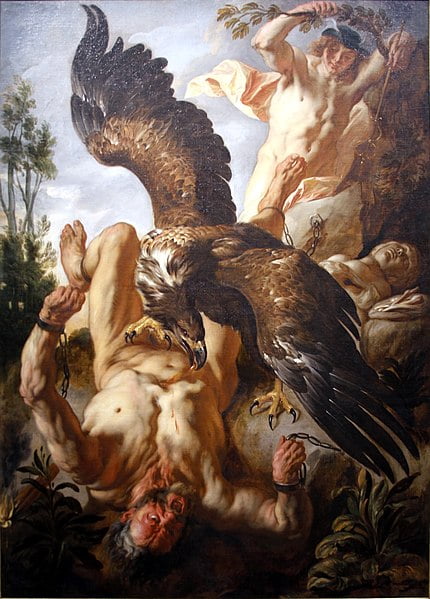
Colossal outsider (Extraplanar, Good)
Hit Dice 48d8+816 (1,032 hp)
Initiative +15
Speed 40 ft (8 squares), fly 60 ft (perfect)
Armor Class 55 (-8 size, +7 Dexterity, +32 natural, +14 insight), touch 23, flat-footed 48
Base Attack/Grapple +48/+81
Attack Slam +58 melee (4d8+18)
Full Attack 2 slams +58 melee (4d8+18)
Space/Reach 30 ft/30 ft
Special Attacks Spell-like abilities, spells
Special Qualities Clay of creation, damage reduction 20/epic, Darkvision 240 ft, improved evasion, improved uncanny dodge, inspire competence, regeneration 5, Spell Resistance 36, wild empathy, woodland stride
Saves Fort +47 Ref +33 Will +44
Abilities Strength 47 Dexterity 24 Constitution 45 Intelligence 40 Wisdom 38 Charisma 35
Skills Appraise +57, Balance +30, Bluff +39, Climb +48, Concentration +60, Craft (alchemy) +50, Craft (sculpting) +83, Decipher Script +60, Diplomacy +68, Disguise +12 (+14 in character), Gather Information +54, Heal +56, Intimidate +14, Jump +52, Knowledge (Arcana) +70, Knowledge (Geography) +55, Knowledge (history) +60, Knowledge (local) +65, Knowledge (nature) +55, Knowledge (nobility and royalty) +50, Knowledge (religion) +55, Knowledge (the planes) +55, Listen +51, Perform (oratory) +57, Perform (sing) +47, Perform (string instruments) +52, Search +50, Sense Motive +71, Spellcraft +72 (+74 scrolls), Spot +51, Survival +14 (+16 on other planes, +16 following tracks, +16 keep from getting lost, +16 aboveground), Use Magic Device +54 (+58 scrolls)
Feats Alertness, Combat Expertise, Craft Wondrous Item, Diligent, Improved Initiative, Magical Aptitude, Negotiator, Scribe Scroll (B), Skill Focus (Craft [sculpting]), Quicken Spell-Like Ability (greater teleport), Quicken Spell-Like Ability (True Strike) Epic Feats Craft Epic Wondrous Item, Epic Skill Focus (Craft [sculpting]), Epic Fortitude, Epic Will, Group Inspiration, Improved Darkvision, Superior Initiative
Environment Olympian Glades of Arborea
Organization Solitary
Challenge Rating 32
Treasure Double coins, double goods, triple items
Alignment Always neutral good
Advancement —
Level Adjustment —
This colossal humanoid bears a wise, regal countenance. He dresses finely, and commands respect with his very gaze.
Prometheus is a wise titan, whose name means “forethought.” He is the son of the Titan Iapetus and the nymph Clymene, and is the brother of the Titans Atlas and Epimetheus. He had no wife, but he had taken as a lover Celaeno, one of the Pleiades (or Seven Sisters), and had a son named Deucalion.
When the Olympian gods and the Titans made war on each other, Prometheus was able to correctly deduce the outcome of the struggle. He was wise enough to ally himself with the gods rather than fight alongside the doomed Titans.
He is credited with creating the first humans, fashioning them out of clay. He is a helpful being, and chooses to assist humankind whenever possible. Prometheus taught humans many of the civilized arts, including the medicinal use of plants, the cultivation of grains, and the domestication of animals.
However, when he stole a flame from the sun to give humankind the gift of fire, he offended Zeus. Zeus ordered that Prometheus be chained to a mountain, to have his perpetually regenerating liver torn out every day by a griffon. After thirty years of this torture, Zeus relented and ordered Hercules to free the Titan. Prometheus was invited to join with the gods, and now dwells among them in the realm of Olympus.
Humans sometimes worship him, and he has a small but growing cult. His followers wear an iron ring set with a chip of stone from the mountain where Prometheus was chained. Prometheus has the ability to create any mortal creature from clay, to use as a servant for a time or to reward a faithful follower with a companion creature. Prometheus uses a torch as his symbol, to represent the fire he stole from the sun.
Prometheus is 100 feet tall and weighs 725,000 pounds.
COMBAT
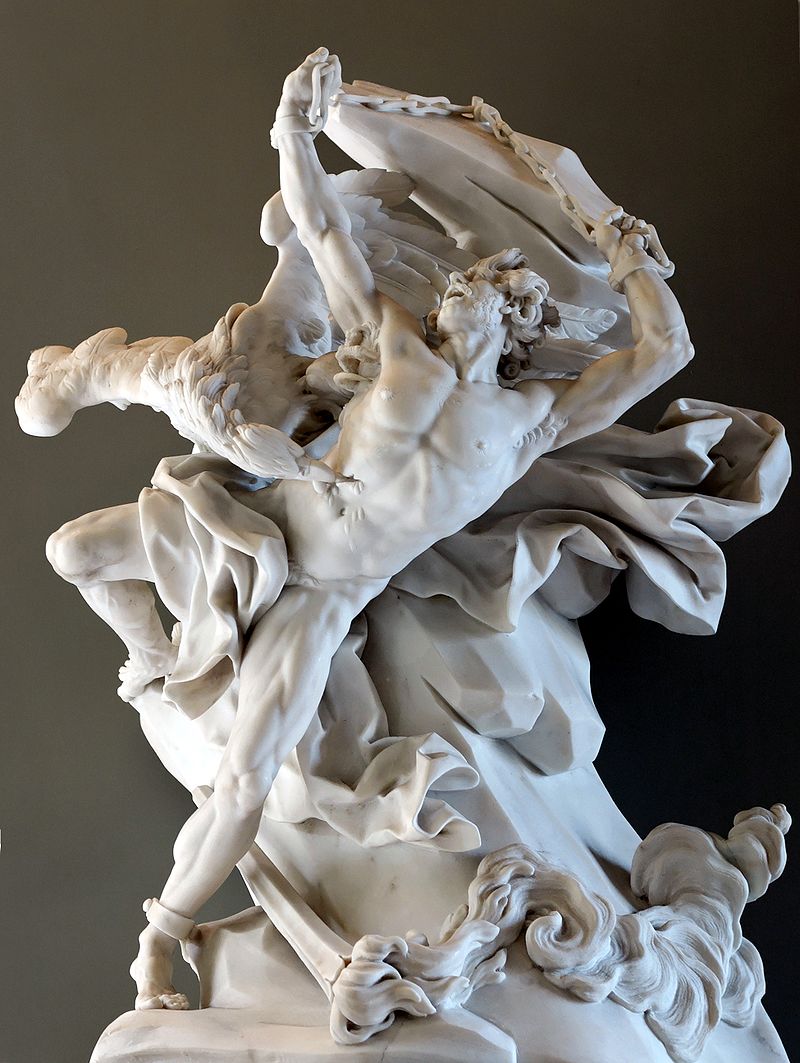
Prometheus is a kind-hearted being, and is not wantonly destructive like most of the other Titans. He prefers to think a problem through rather than resort to force. However, he will always defend himself or any good being. He is loyal to both of his brothers, even though Atlas is evil, and will side with them if they are under attack.
Spell-Like Abilities: At will – chain lightning (DC 28), charm monster (DC 26), cure critical wounds (DC 26), daylight, fire storm (DC 30), greater dispel magic, Hold monster (DC 27), holy smite (DC 26), invisibility, Invisibility Purge, levitate, persistent image (DC 27), polymorph (humanoid forms only, duration 1 hour), produce flame, protection from energy, pyrotechnics (DC 24), read magic, remove curse (DC 26), True Strike;
3/day – etherealness, freedom of movement, greater teleport, summon nature’s ally IX;
1/day – Foresight, gate, greater restoration, maze, meteor swarm (DC 31), moment of prescience, plane shift, wind walk.
Caster level 25th. The save DCs are Charisma-based.
Spells: Prometheus can cast divine spells as a 13th-level cleric. Prometheus has access to the following domains: Good, Fire, Knowledge, and Protection. The save DCs are Wisdom-based.
Typical Cleric Spells Prepared (6/10/10/8/8/7/6/4; save DC 24 + spell level):
- 0 – Create Water, detect magic, light, mending, Purify Food and Drink, read magic;
- 1st – bless (x2), Bless Water, burning hands*, detect evil, divine favor, Entropic Shield, protection from evil, remove fear, Sanctuary, shield of faith;
- 2nd – Aid, Augury, bear’s endurance, bull’s strength, eagle’s splendor, Make whole, owl’s wisdom, produce flame*, shield other, silence, status;
- 3rd – clairaudience/clairvoyance*, continual flame, daylight, helping hand, locate object, prayer, searing light, stone shape, water walk;
- 4th – air walk, death ward, dimensional anchor, dismissal, divination, freedom of movement, holy smite*, sending, tongues;
- 5th – commune, Dispel Evil, fire shield*, flame strike, mass cure light wounds, plane shift, scrying, true seeing;
- 6th – Banishment, blade barrier*, greater dispel magic, heal, Heroes’ Feast, mass cure moderate wounds, wind walk;
- 7th – fire storm*, Holy word, mass cure critical wounds, regenerate, resurrection.
*Domain spell.
Prometheus can also cast arcane spells as a 15th-level wizard. He has access to the following spells:
- 0 – acid splash, arcane mark, dancing lights, daze, Detect Magic, Detect Poison, disrupt undead, flare, ghost sound, light, mage hand, mending, message, open/close, prestidigitation, ray of frost, read magic, resistance, touch of fatigue;
- 1st – alarm, burning hands, Detect Undead, Feather fall, hypnotism, identify, magic missile, obscuring mist, ray of enfeeblement;
- 2nd – bear’s endurance, continual flame, detect thoughts, flaming sphere, fox’s cunning, glitterdust, Mirror Image, owl’s wisdom, protection from arrows, scorching ray, see invisibility, shatter, hideous laughter, touch of idiocy, web;
- 3rd – Blink , clairaudience/clairvoyance, deep slumber, displacement, fireball, gaseous form, halt undead, haste, magic circle against evil, nondetection, suggestion, tongues;
- 4th – fire shield, locate creature, mass enlarge person, mass reduce person, shout, solid fog, stoneskin, wall of fire;
- 5th – baleful polymorph, break enchantment, dominate person, dream, feeblemind, permanency, Wall of Force;
- 6th – antimagic field, contingency, disintegrate, geas/quest, greater heroism, mass bull’s strength, mass suggestion, mislead, true seeing;
- 7th – banishment, delayed blast fireball, greater arcane sight, Greater Scrying, greater teleport, insanity, limited wish, spell turning, vision;
- 8th – grasping hand, discern location, incendiary cloud, irresistible dance, protection from spells, Summon monster VIII, sunburst.
The save DCs are Intelligence-based.
Image of the digital sculpture “Prometheus Bound” by artist Scott Eaton.
Typical Wizard Spells Prepared (4/8/8/8/7/7/6/5/3; save DC 25 + spell level);
- 0 – disrupt undead, ghost sound, mending, prestidigitation;
- 1st – burning hands, Feather fall, hypnotism, identify, magic missile (x2), obscuring mist, ray of enfeeblement;
- 2nd – continual flame, detect thoughts, Mirror Image, owl’s wisdom (x2), protection from arrows, see invisibility, hideous laughter;
- 3rd – Blink , clairaudience/clairvoyance, deep slumber, fireball, gaseous form, magic circle against evil, nondetection, tongues;
- 4th – fire shield, locate creature, mass enlarge person, mass reduce person, shout, solid fog, stoneskin;
- 5th – baleful polymorph, break enchantment, dominate person, dream, feeblemind, permanency, Wall of Force;
- 6th – antimagic field, disintegrate, greater heroism, mass bull’s strength, mislead, true seeing;
- 7th – banishment, greater arcane sight, greater teleport, insanity, spell turning;
- 8th – grasping hand, discern location, protection from spells.
Clay of Creation (Su): At will, as a full-round action, Prometheus can shape clay into the form of any living non-unique creature that is not of extraplanar origin. The sculpture becomes a living creature with average statistics for its type. This creature will serve him until it dies, though Prometheus usually sets it free after a specific service. Prometheus may also set the creature to be a companion for another being of his choosing.
Prometheus can control only 50 HD worth of such creatures at a given time. If he exceeds this number, all the newly created creatures fall under his control, and any excess creatures from previous castings become uncontrolled. (Prometheus chooses which creatures are released.)
Improved Evasion (Ex): If Prometheus makes a successful Reflex saving throw against an attack that normally deals half damage on a successful save, he instead takes no damage, and takes only half damage on a failed save. If helpless, Prometheus does not gain the benefit of improved evasion.
Improved Uncanny Dodge (Ex): Prometheus retains his Dexterity bonus to AC when flat-footed, and he cannot be flanked except by a rogue of at least 52nd level. He can flank characters with the uncanny dodge ability as if he were a 48th-level rogue.
Inspire Competence (Su): Prometheus can use any of his Perform skills to help an ally succeed at a task. The ally must be within 30 feet and able to see and hear Prometheus. Prometheus must also be able to see the ally.
The ally gets a +2 competence bonus on skill checks with a particular skill as long as he or she continues to hear Prometheus’ performance. Certain uses of this ability are infeasible. The effect lasts as long as Prometheus concentrates, up to a maximum of 2 minutes. Prometheus can’t inspire competence in himself. Inspire competence is a mind-affecting ability.
Regeneration (Ex): Prometheus takes damage from epic evil-aligned weapons and from spells and effects with the evil descriptor.
Wild Empathy (Ex): This power works like the druid’s wild empathy class feature. Prometheus adds a +30 competence bonus and his Charisma modifier (+12) to the 1d20 roll to determine the wild empathy check result.
Woodland Stride (Ex): Prometheus may move through any sort of undergrowth (such as natural thorns, briars, overgrown areas, and similar terrain) at his normal speed and without taking damage or suffering any other impairment. However, thorns, briars, and overgrown areas that have been magically manipulated to impede motion still affect him.
Originally found in the first edition Deities and Demigods (1980, James M. Ward and Robert J. Kuntz).
Currently in the World
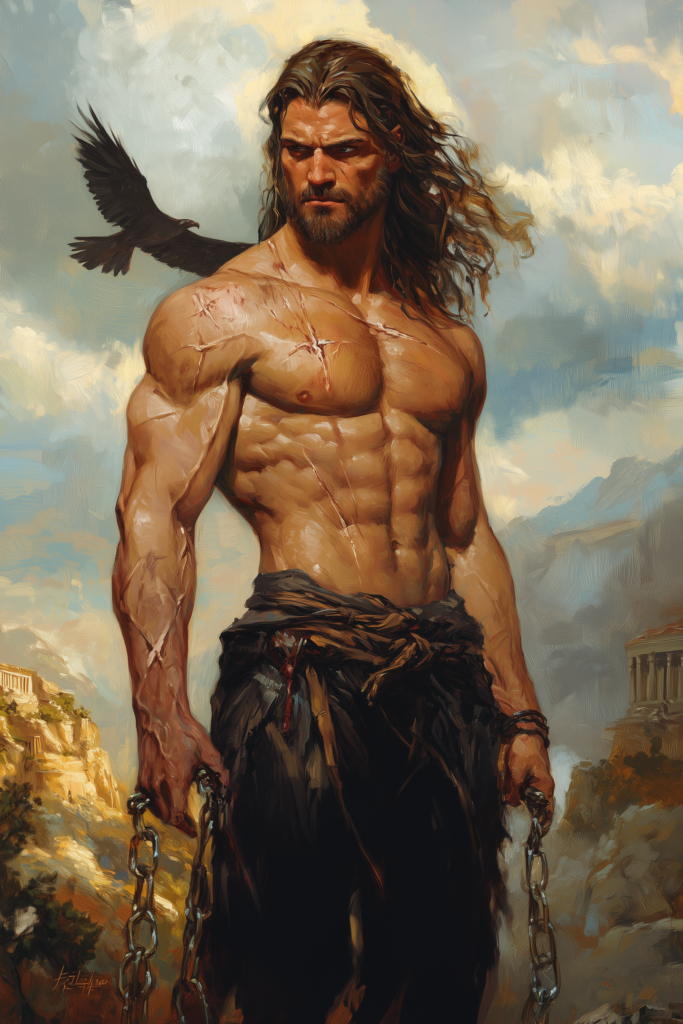
In the beginning, when the gods ruled with unquestioned authority, Prometheus saw what they did not—humanity’s boundless potential. While Zeus and the Olympians kept mortals in ignorance, Prometheus, a Titan of foresight, defied them. He stole fire from the heavens, the divine spark of knowledge, and gifted it to humankind. This act was not just an act of rebellion—it was a declaration. Humanity was not meant to remain in darkness.
Zeus, enraged by Prometheus’ defiance, punished him in the cruelest way imaginable. Chained to a jagged cliff, he suffered daily torment as an eagle devoured his liver, only for it to regenerate by nightfall. But even in suffering, Prometheus did not regret his actions. He watched, bound but unbroken, as humanity took its first steps into civilization. They tamed fire, forged tools, built cities, and raised monuments to their growing knowledge. Each flickering torch and glowing forge was proof that his sacrifice had not been in vain.
For centuries, Prometheus endured his torment, but fate had not abandoned him. One day, Hercules, the great hero, found him on his journey and, moved by the Titan’s suffering, took up his bow. With a single arrow, he slew the eagle, ending Prometheus’ torment, and shattered the chains that bound him. Prometheus was free.
Though unchained, Prometheus did not return to Olympus, nor did he seek vengeance on Zeus. Instead, he remained among mortals, watching as they shaped their world. The fire he had given them burned not just in their hearths but in their minds. He saw the rise of Greece, where thinkers like Socrates, Plato, and Aristotle questioned existence itself. He saw Rome, where law and governance reshaped civilization. He saw the collapse of empires, the burning of libraries, the struggles of humanity as knowledge was won, lost, and won again.
Through the long centuries, Prometheus walked unseen, a silent guide. When the Dark Ages descended and much of the ancient wisdom was forgotten, he remained hopeful. He saw the flickers of light in hidden places—monks preserving texts in quiet monasteries, scholars in the Islamic world keeping the sciences alive, whispers of knowledge surviving in the margins of history. The fire he had given humanity had dimmed, but it had not died.
Then came the 15th century, and with it, a new kindling of the flame—the Renaissance. He watched as painters, thinkers, and inventors reignited the thirst for knowledge. And then, in the 1450s, Johannes Gutenberg built the printing press, a machine that would change everything. No longer would knowledge be confined to the few. Books, once treasures of kings and scholars, would spread across the world, placing the power of thought into the hands of the many. This, Prometheus knew, was the next great fire.
He stood in the shadows of history, unseen yet ever-present, as humanity embraced its destiny. His goal had never been to rule or to be worshipped—only to ensure that mortals would never again be kept in darkness. Zeus had once feared that if humanity gained too much knowledge, they would no longer need the gods. Prometheus had known the truth all along: humanity was always meant to be free.
The Titan of foresight smiles as he watches the fire spread—not as destruction, but as enlightenment. His task is not finished, but he no longer walks alone. The fire is in the hands of the mortals now, and they will carry it forward, shaping a future that even the gods cannot control.
Prometheus’ Plan: The Liberation of Humanity
Prometheus has always had one goal: to elevate humanity beyond the control of the gods. From the moment he stole fire from Olympus, his actions have been guided by a singular vision—to empower mortals with knowledge, creativity, and self-determination so that they would no longer live in ignorance or under divine tyranny.
The Core of His Plan
- Ignite the Spark of Knowledge
- His first and most famous act—stealing fire—was not just about warmth or survival. Fire symbolized technology, intelligence, and progress. With it, humans could forge tools, build civilizations, and begin their ascent toward mastery over their world.
- Ensure the Expansion of Thought
- Fire was only the beginning. Prometheus encouraged the development of philosophy, science, and art. He observed and subtly guided humans toward enlightenment, ensuring that the embers of innovation never died, even in times of darkness.
- Resist Tyranny
- Zeus punished him because the gods sought to keep humanity dependent. Prometheus, however, aimed to break this cycle. His plan was not just about giving fire—it was about teaching mortals to think for themselves, to challenge authority, and to create a world where the gods were no longer needed.
- Preserve and Spread Knowledge
- Throughout history, Prometheus ensured that human knowledge survived and spread. He watched over scholars, philosophers, and revolutionaries. The printing press in the 1450s was a pivotal moment—mass education and shared knowledge meant that no single power could control wisdom anymore.
- Humanity’s Ultimate Independence
- Prometheus’ endgame is clear: a world where humans are completely self-sufficient, where they are not ruled by fear, ignorance, or false gods. He envisions a future where knowledge is limitless, innovation never ceases, and humanity stands fully independent—masters of their own fate.
Is His Plan Complete?
Not yet. While humanity has come far, there are still forces—both mortal and metaphorical—that seek to limit knowledge, stoke ignorance, and maintain control. Prometheus continues to watch, waiting for the day when humanity no longer needs a Titan to guide them. His fire still burns in the hearts of those who seek truth, challenge oppression, and push the boundaries of human potential.
The question is: Will humanity fully embrace the fire, or will they let it be extinguished?

 Buy me a coffee
Buy me a coffee